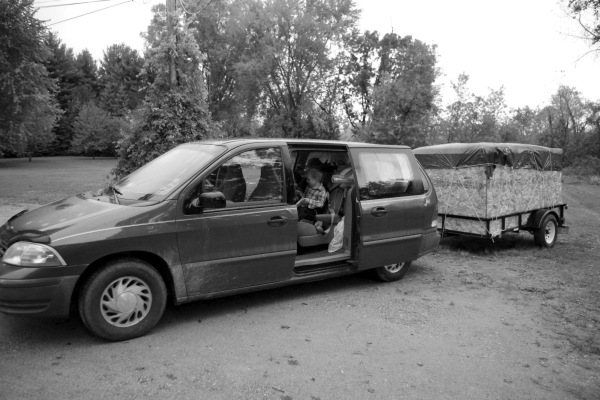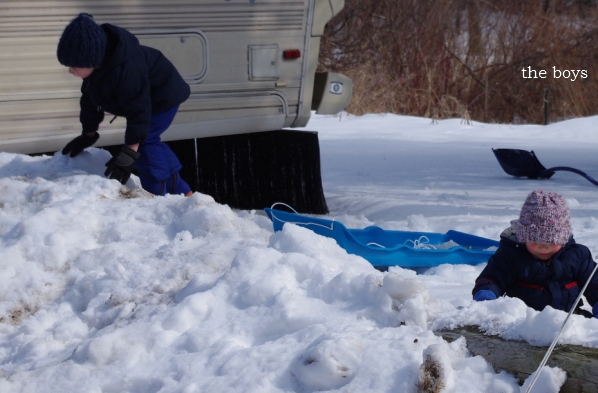Homesteading, Part 4: Choosing Production over Consumption

This post was originally published in October, 2009 – a full two years before we arrived here on our land. It seems fitting to republish while we are hurrying to get as many seeds into the ground as we can.
Previously in Homesteading:
- Part 1: Why Homesteading?
- Part 2: If You Eat it You Should Grow it.
- Part 3: What is Sustainability?
In contemplating where I would turn to next in my homesteading series it hit me that one of the driving forces behind my own desire to homestead is a desire to produce and create rather than consume and throw away. I suspect that I am not alone amongst my fellow homesteader wannabes.
The Produce vs. Consume dilemma comes up every day in little and big decisions. It seems there are generally two paths:
- Join in the money-making venture of capitalist employment, trading your time for a wage of some sort. Use the wages you have traded your time for to purchase items (food, clothing, shelter, entertainment, etc.) that have been produced by someone else who is generally trying to eek as many pennies out of you as possible.
- Simplify your "needs", buck the time for wages trade-off, and spend your time producing those basic things that you and your family need to live.
Obviously there is some wiggle room in between these two, but the basic premise of produce vs. consume are always the common denominators.
For example, something as simple as "what will we eat for breakfast?" leads us down two paths:
- Eat an already prepared product such as breakfast cereal & conventionally produced milk to save yourself time, but pay a higher price in both your health & your pocket book.
- Make a breakfast out of whole foods, preferably ones grown/raised by you or a neighbor. You will spend a little bit of extra time, but you will gain financial & physical independence, along with the many benefits of being a producer rather than a consumer.
The Benefits of Being a Producer
Obviously there are a lot of benefits to being a producer rather than a consumer. Too many to list, really, so I will just name a few.
- Learning from the Process. In our industrialized society we go right from the want/need to the have, skipping the work, and therefore the spiritual & physical lessons, that come with the process of getting there.
- Seeing First Hand the Provision of God. In relation to learning from the process, we must truly know need and see the process in order to fully appreciate the fact that everything is given to us by our Creator. Paying money for a carrot does not allow us to see the full on miracle that is the production of food, let alone the sovereignty of God in the process.
- Knowing Where Things Come From. Every week I ask the question "where does your food come from?" in Food Roots. The reason I pose that question is so that we will consider how food gets to our table, who has to do the work to produce it, how none of it is possible without the hand of God. When we miss out on the origins and the journey of our food and other goods we are missing out on a key understanding of one of the first commands of God.
Call it what you will – homesteading, getting "back to the land", or agrarianism – in every case we are becoming producers.
How do you choose production over consumption on a daily basis?



Thaks for posting it – I´ll look into it.
I’m loving your blog!
I just started a new blog and would love it if you would stop by! Eliza’s blog
Do you live in the country or city?
I will probably always live in the city that is why I was asking. I would still like to do homesteading on some level.
I tried planting a garden this year peas, cucumber, tomatoes, bell pepper, jalapeño, spinach, carrots, beets, potatoes, dill, basil, and parsley. Most of it failed. (I have some of the herbs and the tomatoes are doing ok. That is it) It was so discouraging. I guess my soil needs a lot of work. Unfortunately we’re living in a rental and won’t be here next summer. So tearing up a piece of land ect. seems like it was for nothing.
When we buy a house, I’d like to homestead in a garden that will be a garden for more then one season. So, when I learn about my little garden I can apply it next year. I’d like to raise chickens, have a good size garden, and maybe even bees if I can keep them far away from my (Lord Willing) future younguns.
Do you have any tips on city gardening?
I am excited to find this site. I have to admit – I always thought of homesteading as someone who stayed away from technology living off grid sounds so “backward” I couldn’t imagine being without my computer, blogs and library of resources the internet provides. Now that I have a more realistic definition of homestead – I realize that is really our family IS striving for.
Our garden failed last year too. But it just made me that much more grateful and dependent on God – who makes those seeds grow. We will try again using new found resources. Can’t wait to explore your blog more.
This is at the forefront of what we are trying to do as a family now. We want to be producers and not consumers. The biggest way we are doing this is with our food. We have been planting fruit trees and other fruit producing plants, this year we are planting asparagus which will come back on it’s own, and we have been planting a garden which has grown every year. We have been chosing to plant things that will provide flowers and food instead of just a pretty flower. We want to learn to make our own soap and candles and so many other things. I have learned to knit and will be elarning to crochet. When we do buy something, we try to shop second hand. We are on a journey to become producers instead of consumers.
I love your website!!!!I sattred reading about the cattle panel chicken coop saw the photo of the panels on the minivan and hooted! And kept reading.My wife and I bought a 109 acre Farm in SW Wisconsin in 2002. When you described mowing by looking straight ahead so you wouldn’t get depressed that resonated with us! We cannot believe how tired we are each weekend working there (we live 3 hours back toward Milwaukee so only weekends are when we get to work there).What a great website! Whereabouts in S Wisconsin are you guys? I have a million questions.Tom & Barb